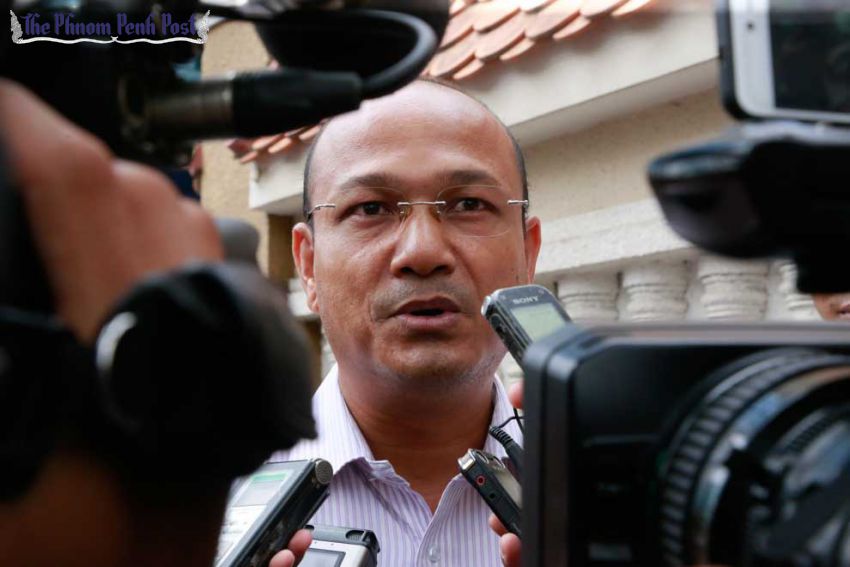Independent labour inspection body, Better Factories Cambodia, comes under pressure from the Cambodian Government
In the lead up to the 2018 election, independent civil society organisations, unions and institutions are coming under great pressure from the Cambodian government. The opposition party has been dissolved and Kem Sokha, the president of the Cambodia National Rescue Party is being held in solitary confinement in a prison near the border of Vietnam.
Human rights defenders - Mr. Pa Nguon Teang, Executive Director of the Cambodian Center for Independent Media, Venerable But Buntenh, Executive Director of the Buddhism for Peace Organization, and Mr. Moeun Tola, Executive Director of the Center for Alliance of Labour and Human Rights (CENTRAL) - have been charged with spurious charges in relation to funeral costs. Moeun Tola is my friend and is admired worldwide for his courage in promoting human and labour rights in Cambodia. He was recently awarded the 2018 Labor Rights Defender Award from the International Labor Rights Forum. In an email I received from him last week, he wrote 'I am now still safe, but we will see what would happen soon after the Chinese New Year'. I fear for his life in this crackdown on independent voices before the July election.
One of the less reported instances of state pressure is the treatment by the government of the joint International Labour Organisation and International Finance Corporation body - Better Factories Cambodia. Better Factories Cambodia was the precursor to Better Work, and has formed the basis of subsequent programmes in Vietnam, Jordan, Haiti, Lesotho, Nicaragua and Indonesia. The organisation is widely credited for improving labour rights in Cambodia's garment industry, from some of the worst globally in the late 1990s, to broad compliance with core labour standards today (apart from wages).
A senior member of personnel from Better Factories Cambodia recently confided in me that the body is increasingly coming under pressure from the Cambodian government. For example, more than one letter from the government has been received claiming that it has failed to pay taxes. My source has good reasons for asserting this claim is false.
In a recent journal article, I analyse the precarious place of Better Factories Cambodia in Cambodia's political economy. By drawing on the rich literature in the field of political economy concerning Cambodia, the article highlights how Better Factories Cambodia operates within the political and economic system of neo-patrimonialism which the longstanding Hun Sen government has fostered. Although some authors had considered the initiative in light of “corruption” (Hall 2010, Kolben 2007, 2004), this offered only a thin understanding of the dynamics of power maintenance by the ruling elite. Indeed, understanding certain behaviours and sets of relations in terms of “corruption” tends to a view that they are an aberration or somehow outside of the normal order. This view inhibits an understanding of these behaviours and relationships as part of a relatively stable political economy.
The article explains how Better Factories Cambodia's mandate left it unable to challenge state-generated labour rights breaches. In particular, it has in the past been powerless to address what was widely regarded as the most important factor in production for investors in Cambodia — low wages — allowing Cambodia to maintain its position as a low unit labour cost country. In the period of study, the government has agreed to increase wages. Repeated fieldwork has shed light on why this might be the case. Desperate concern and anger about low wages was one of the main reasons thousands of people protested, blocking the streets of Phnom Penh before and after the last election. Interviewees in 2017 suggested that by increasing minimum wages and promising further increases in future, the Hun Sen government is attempting to allay the risk of mass protests of this type before the 2018 election. At the same time, the government has increased restrictions on the operation of independent unions, thereby hampering the activities and authority and source of legitimacy of the greatest source of opposition during the 2014 election.
Since 2010, I have visited Cambodia most years to conduct fieldwork. This has allowed the mapping of changes in the industrial relations and political landscape, and provided a deeper understanding of the operation of Better Factories Cambodia in practice. The article argues that although coordination with the Ministry of Labour may contribute to the building of the capacity of the government’s inspectorate, there are risks entailed in this cooperation. As the Hun Sen government attempts to extend its policy autonomy from international organisations, Better Factories Cambodia may find its influence further reduced. Its continuing influence depends on the one hand on its integrity, which may be challenged by cooperation with the state labour inspectorate, and on the other hand by demand from the international brands who rely on it for the monitoring of the labour standards under which their garments are produced.


